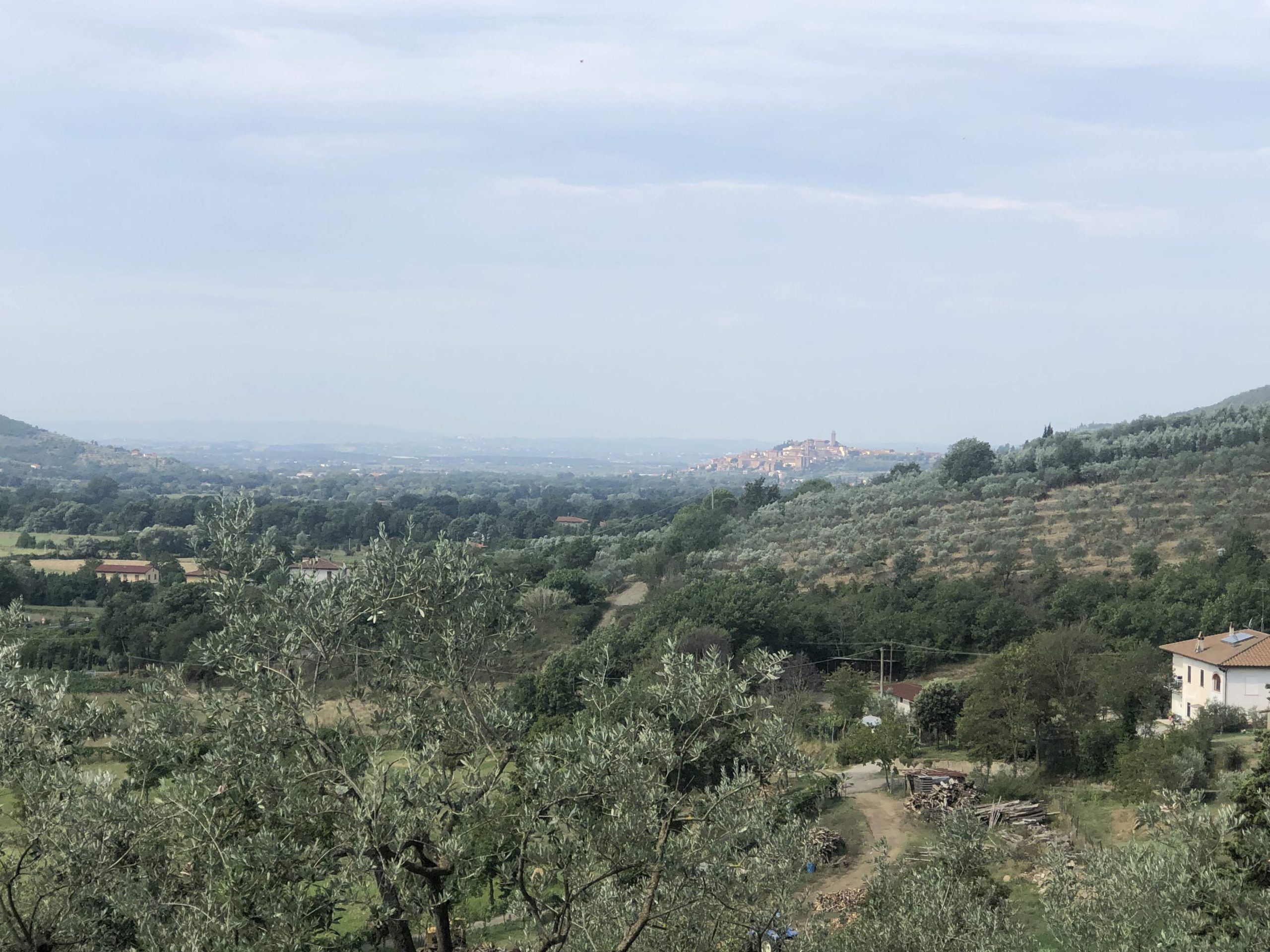The time before YC
I'm James, and I work with Tim. We are the co-founders of PostHog - a current batch YC company.
This is us (I'm on the right), just after we got now-redundant, pre-pivot swag:

We quit our jobs around August 2019, and put the last $8K of salary into a business bank account. We had both saved enough money to live on for at least 12 months without any income.
I went travelling with my wife for 3 weeks around Europe whilst we worked on our first idea.
Our product was 'a sales territory management platform, that uses predictive analytics so you stop wasting time on deals that won't sell'. I used to run a sales team, and this was something I'd have wanted to help me manage territories. Tim ran R&D and was very quick at building things.
Tim built the product and I started doing customer calls from the cheapest Airbnbs I could find around Lake Geneva, cafés in Venice and a hut in an olive grove in Tuscany:

Not only did I have slow wifi, but the idea was complicated and people didn't get it. We had just two customers start using it, and that's only because they were already our friends. One of those two was happy paying $200 MRR for it, but then his company pivoted. We ended up bringing Aaron on board as our first employee the following January.
If we explained the complex modelling, we'd watch people's eyes glaze over. If we didn't, they wouldn't believe it worked.
We decided to simplify it. We turned our 1-liner into "a sales 1:1 tool that uses predictive analytics to make sure you talk about the deals that matter". When I ran sales, I struggled to find time to do this, yet I felt it was important, and I felt that salespeople would want to talk about good news but not bad news. Our predictive analytics could keep 1:1s well organised and balanced.
I drove back to the UK from Tuscany. Sidenote: my ac broke and it was the hottest day of the year. It was a 30 hour drive.
Tim and I managed to get cheap WeWork access. We spent $100/month each. If you're in the US, I would get a platinum AMEX card instead, it's an even better deal. It wasn't perfect, but working together and not in cafés helped our focus immeasurably.
Although I can code, I am too slow, but I have done a lot of sales and marketing before. We split our roles out clearly. Tim was to build the product, I was to book 2 meetings with heads of sales every day.
We did that for 3 weeks. We wrote lengthy notes and took quotes from every single meeting in a gigantic Google Doc. We hit our target. I got meetings by finding real life communities, making friends in those and asking around. I also used LinkedIn a lot, engaging in conversations and eventually asking to talk about our roadmap with people who might find it interesting. People are pretty helpful if you are just asking for advice and not trying to sell them. It was uncomfortable and hard work, but it helped us constantly "talk to users" - something YC preaches.
In the product, we focused heavily on the onboarding flow. We wanted each user to bring more than 1 extra user. Just like Facebook in the early days. When a user signed in, it would send them to a page that'd read their calendar to guess which meetings were 1:1s, and it'd ask them to invite those users. Once they were in the tool, it'd also integrate with Slack so it'd remind you to plan your 1:1s and it'd let you plan the whole thing through their UX.
The calls sounded like they were going really well. 15 people said they would use it for their team.
After the first week of building it, we started sending the link out to sign up after each call.
Almost no one even clicked the link in the email. Not a single person planned a 1:1 with it properly.
YC later told us, at the induction, that we should read The Mom Test. Now we know why. We think we failed because we didn't ask if sales leaders have ever planned their 1:1s in advance, and to show us what their agenda looked like. It turns out, they usually don't. If this really felt like a problem to them, they would.
It was around this time we thought about applying to YC. We had originally had visions of bootstrapping.
Sat in the bright lights and gentle noise of people cold calling from communal work areas, fuelled by a free oat cappuccino or four, Tim and I talked about what we would regret not doing when we were 80.
That turned out to be the most helpful way to clarify what we actually wanted. We decided that we could bootstrap and over 4 years get to the kind of job we already had with good pay and with financial stress along the way. That sounded slow, and dull.
We wanted to push for more. We wanted to go bigger. Getting fuel from VCs meant our success wouldn't come from owning a huge pie, we'd own a smaller chunk of a massive one, and we would get a lot more breadth of experience by doing this. Neither of us is particularly patient, and so we decided shooting for the stratosphere would be more fun.
We had a problem though. The YC deadline was looming, we had a product no-one cared about. That's not what the YC t-shirts say.
It was now a Thursday evening, the deadline was Tuesday.
We decided we wanted to focus on developers. They'd give a better signal:noise ratio when we asked them what they needed, and they'd be more willing to try new products out.
In our past, we both saw challenges with tech debt when organisations scale. It causes shipping to slow down and good engineers to get frustrated.
I did the website, Tim did the product. I started outreach to every developer I knew, interviewing them on pain points. The good news was that a bunch of our friends worked at big companies.
Tuesday swung around. We had an MVP working and we had developers at 10 companies saying they were interested.
We wrote the application form. We kept talking about benefits. My previous job was selling enterprise software to banks - that's how I write by default.
Each word had way too many letters, and it was boring. We chucked it away, at 8pm - the night it was due.
Everyone in the example application videos had thousands of users, revenue or had worked at impressive companies. We were intimidated by them.
The situation on paper was so bad, that it felt funny.
We relaxed, and wrote in natural language using very few, and very simple, words.
We put together a video of our MVP for the demo. We designed it to look so simple it felt tongue in cheek:
Neither of us has worked at a FANG company. Neither of us knew anyone at YC, and my only knowledge of the West Coast came from my wife making me watch the OC with her. We had no actual users, and we definitely had no revenue.
We got the interview email.
We just followed the instructions, and got in. They take people at any stage if they like the application.
Enjoyed this? Subscribe to our newsletter to hear more from us twice a month!
PostHog is an all-in-one developer platform for building successful products. We provide product analytics, web analytics, session replay, error tracking, feature flags, experiments, surveys, LLM analytics, data warehouse, CDP, and an AI product assistant to help debug your code, ship features faster, and keep all your usage and customer data in one stack.









